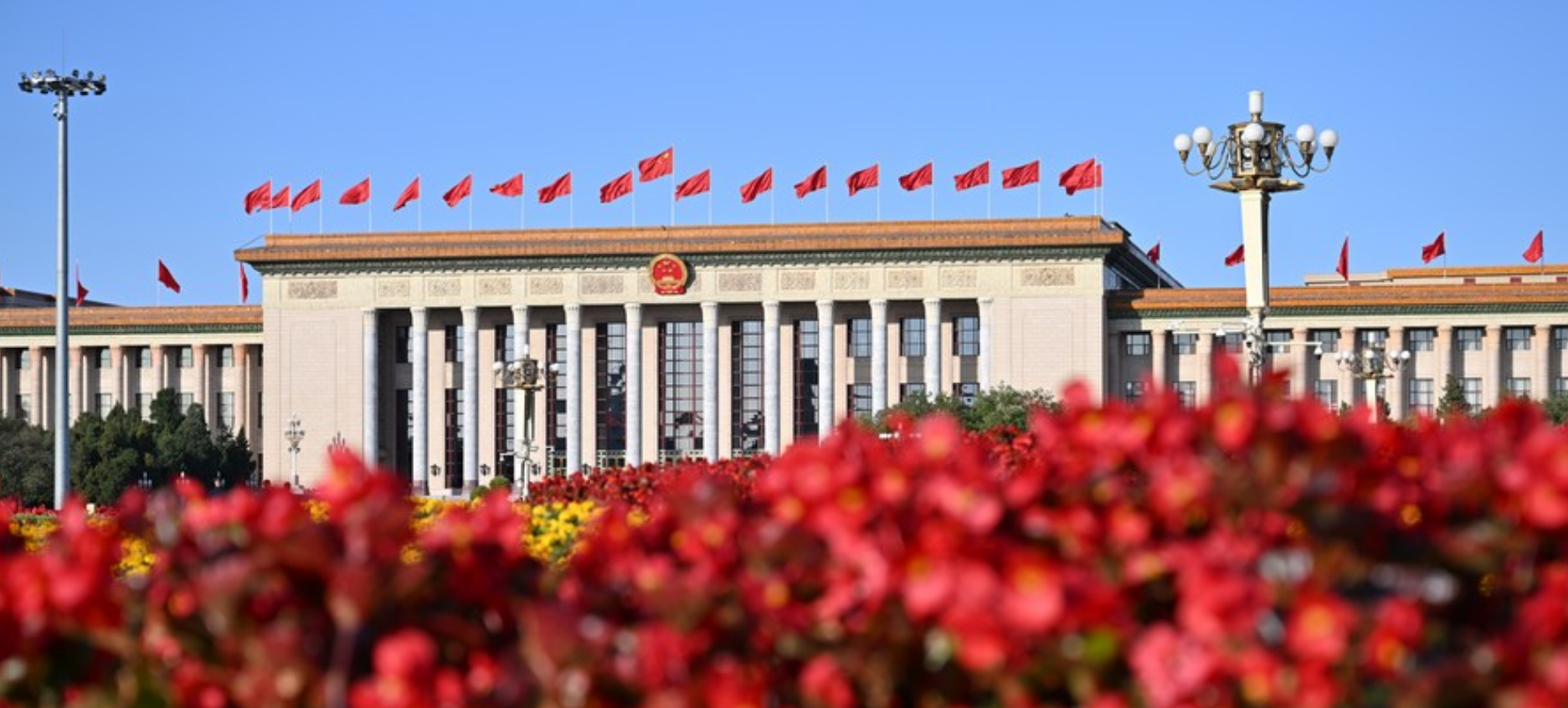Government News
Symbiosis a key element of peaceful development 2022-12-01

This photo taken on Oct 16, 2022 shows the Great Hall of the People in Beijing, capital of China.
The world is at a critical juncture. Will it maintain a global order dominated by a few powerful countries that subordinate most countries, or will it seek deeper peaceful, symbiotic relations between countries and a new globalization?
In the face of the complex global landscape, the report to the recent 20th National Congress of the Communist Party of China has reaffirmed that China pursues friendship and cooperation with other countries on the basis of the Five Principles of Peaceful Coexistence and promotes the building of a new type of international relations, featuring equality, openness and cooperation.
It is also committed to deepening and expanding global partnerships based on converging interests. China firmly opposes all forms of hegemony and power politics. It also promotes major-country diplomacy with Chinese characteristics and the building of a community with a shared future for humankind.
These are China's consistent foreign policies. In the early days of the founding of the People's Republic of China, China proposed developing state-to-state relations based on the Five Principles of Peaceful Coexistence, which can actually be traced back to the tradition of upholding peace and internationalism since the founding of the CPC.
Unlike some Western countries that handle international relations by trying to exclude countries from the international community or dominating other countries by means of military force, China has never advocated coercion, decoupling or refusing negotiation to resolve conflicts. From the emphasis in the report to the 20th National Congress of the CPC on "fostering a new type of international relations", to "deepening and expanding global partnerships based on equality, openness and cooperation" and practicing "true multilateralism", it is easy to see that China is using dialectical thinking, viewing things as a unity of opposites, and striving to promote and uphold orderly and common development amid a complex environment. The contemporary form for this is "a human community with a shared future".
The concept of "a human community with a shared future "needs to be understood and studied with a view to its connotation of common development. In the report to the 18th CPC National Congress in 2012, it was clearly stated that "in promoting mutually beneficial cooperation, we should raise awareness about human beings sharing a community of common destiny. A country should accommodate the legitimate concerns of others when pursuing its own interests".
The development of one nation alone cannot bring about the comprehensive stability and peaceful development of the international community. It is necessary to explore a path of peace and development from the perspective of global interests rather than the interests of a particular country. However, Western countries are wary and worried about China's peaceful development, mistakenly believing that the concept of a community with a shared future and the Belt and Road Initiative are hegemonic foreign policies aimed at exercising economic domination over China's surrounding regions. At present, the "community with a shared future" advocated by China is closely related to its willingness to coexist peacefully.
China has signed collaboration documents with 149 nations and 32 international organizations to carry forward Belt and Road projects, and more than 100 states and regions have signed up to join the Asian Infrastructure Investment Bank. China is actively promoting mutually beneficial cooperation projects with other countries.
In the meantime, as a developing country, China does not blindly pursue economic expansion, but rather strives to promote high-quality growth as a major participant in global environmental protection. It is at the forefront of the world in its efforts to realize its carbon peak and carbon neutrality goals, and in the use of renewable energy and the greening of deserts.
China is on a modernization path with Chinese characteristics, combining the basic tenets of Marxism with China's specific reality and the advantages of socialism with Chinese characteristics.
In recent years, Western countries' rebuking of the Chinese government has completely ignored China's peaceful development practice. This was clearly stated in the report to the 20th CPC National Congress: "China has always been committed to its foreign policy goals of upholding world peace and promoting common development, and it is dedicated to promoting a human community with a shared future."
China's definition of development is not based on hegemonic and bullying acts but on peaceful development guided by coordination, equality and symbiosis. China's promotion of partnerships embraces countries hostile to and trying to contain China as well as friendly nations.
China seeks to build a network of international and mutually inclusive coexistence relationships to achieve the peaceful development of mankind as a whole. Based on its own ideas and practices, China provides valuable experience and a new path for the world at this critical moment.
The author, an associate researcher at the School of Humanities at Shanghai Jiao Tong University, contributed this article to China Watch, a think tank powered by China Daily.
Source: China Daily
Application Status
| 04-16 | 21315227 | Processing |
| 03-12 | 21315226 | Processing |
| 09-26 | 21315225 | Processing |
Inquiry Status
| 02-29 | 02131558 | Received |
| 03-06 | 02131557 | Received |
| 11-14 | 02131556 | Received |
FAQ
Q: Q: Is there a place where I can get...
A: A: Log on to http://touch.shio.gov....
A: A: Log on to http://touch.shio.gov....
Q: Q: What is the easiest way to set u...
A: A: 1. Log on to http://touch.shio.g...
A: A: 1. Log on to http://touch.shio.g...
Q: Where can I get an English map of S...
A: English maps of Shanghai are availa...
A: English maps of Shanghai are availa...
